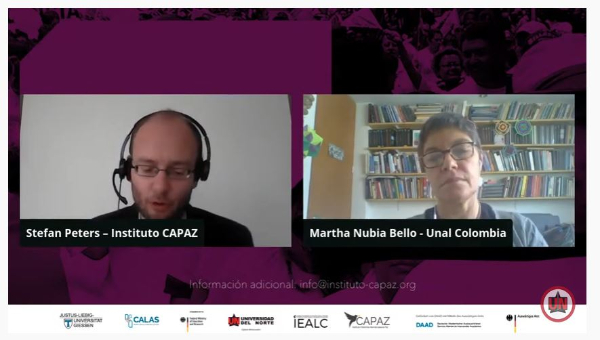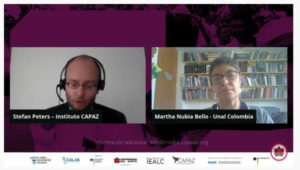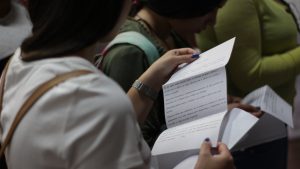
Senses and disputes over memory: a victim’s perspective

Captura de la transmisión/Recording’s screenshot
Martha Nubia Bello’s lecture was particularly valuable in view of the recent violence in various parts of Colombia, and emphasised as being so by CAPAZ Academic Director, Prof. Dr. Stefan Peters. The researcher and professor at Universidad Nacional de Colombia gave her lecture on August 18, 2020, as part of the series of conferences included in the International Seminar on the History and Memory of Violence and Conflicts in Latin America.
The series of lectures will be held online and include lectures by experts on the dynamics of violence and conflicts in Latin America, based on the perspectives of history and memory. The seminar is organised by CAPAZ, in partnership with the Institute for Latin American and Caribbean Studies at Universidad del Norte (Colombia), the Justus Liebig University Giessen (Germany), and the CALAS Centre.
Memory in context
Martha Nubia Bello focused her lecture on the perspective of memory work undertaken by victims in Colombia. She highlighted the fundamental purpose of the exercise of memory as the pursuit of justice, the claim, the need for answers. The victims’ voices are recognised and legitimised through memory, in a country where the armed conflict has been declared as inexistant, said Bello. “Without any explicit intention, it is a journey into the past, above all in the pursuit of answers, explanations, and meanings. It is a journey embarked on wanting to face its challenges”.
The exercise of memory – individual and collective – involves more than just data and facts; memory is motivated by relationships with others. It is an emotional process of comings and goings, in which stories are constructed through new, alternative and confrontational narratives.
You may also like: La memoria en medio de la guerra, un análisis del contexto colombiano (published: 19.8.2020, Universidad del Norte)
Over the last twenty years, Colombia has exercised memory in the midst of the armed conflict, with moments of resurgence and others of hope in the face of the possibility of peace. In this lapse, victims’ demands on the State have stood out, as a revindication of their right to memory. Memory has acquired a reparative nature, which transcends the political and legal. Professor Bello also highlighted the importance of memory in the context of negotiations during this time.
The armed conflict in Colombia has been long and complex. Martha Nubia Bello took on the task of showing the figures that reveal a painful reality: more than 260,000 deaths between 1958 and 2016; more than 9 million recognised victims of various forms of violence; nearly 29,000 kidnapping victims, more than 83,000 victims of forced disappearance, and millions of internally displaced persons. In Colombia’s conflict, there have been multiple armed and non-armed actors, whose discourses and modes of operation have been transformed over time, thereby creating greater complexity for exercises of memory.
The context is not linear and is characterised by different and changing regional realities. Bello explained that some regions of Colombia are experiencing post-conflict dynamics; in others, the war continues; there are regions where the implementation of peace agreements has been difficult; and in others still, peace is still not possible.
Certain discourses in Colombia have, despite the evidence, attempted to deny the existence of the armed conflict or of the victims of State actors. This denialist vision reduces these realities to highlight the actions of some of the actors, thus positioning them as the sole perpetrators, the researcher emphasised. The memory exercises of the victims in Colombia claim their existence; they are evidence of the war. They are based on objects and artifacts that the victims themselves have kept for years and that give an account of what they have experienced: they are evidence of the existence of the war and of the conflict that some voices have tried to negate.
The right to memory: laws and legitimacy
Between 2005 and 2012, two very important processes emerged in terms of the legal recognition of victims: Law 975 of 2005, under the government of Álvaro Uribe Vélez, and Law 1448 of 2011, called the Victims’ Law, under the presidency of Juan Manuel Santos. The first law was criticised in Colombia and abroad for creating conditions for impunity and offering few guarantees to victims. The victims played a key role during this period, through their mobilisation and their demands for the inclusion of genuine institutional work for memory. One of the greatest demands in terms of institutionality for the period was, precisely, that of public recognition, their participation in dynamic platforms in pursuit of the truth, in full autonomy, without serving an official discourse.
The negotiations
The role of memory in the peace negotiations with the FARC-EP guerrilla group came to the fore between 2012 and 2016. As part of this process, discussions took place regarding, among other things, which version(s) of the conflict would be told, by whom, and how they would be told. The victims were present and participated in the negotiations in Havana. And, not only that, they would be at the centre of the negotiations. The victims confronted the parties, put forward their own reflections on the causes of the war, and pressed the issue of responsibilities in the conflict, which must be assumed by all.
The post-agreement period
Memory processes and actions had been taking place in Colombia as reparation measures prior to the Havana peace process. Many of these were the result of judicial rulings and others as administrative measures as of Law 1458 of 2011, giving rise to bodies such as the National Centre for Historical Memory (CNMH) and the Victims’ Assistance and Reparation Unit. The actions were framed as those of a post-conflict scenario (let’s recall the non-linear nature of memory building in Colombia). The victims participated in the memory exercises – places of memory such as museums, community centres, archives – and contributed their points of view, experiences, stories, and accounts.
The meanings of memory: why is memory made and what for?
Martha Nubia Bello highlighted six areas:
1) Memory as a tool for denunciation, “so that people know what happened to us”, paraphrasing the victims. It serves to deny, face accusations, clarify, and do justice.
2) Memory as a therapeutic resource to grieve, to understand what happened, to assume losses, to heal. Memory provides spaces for meeting and connecting with others based on common experience. It also makes possible new narratives to resignify war.
3) Memory as a tribute and homage to the absent, which expresses the responsibility of the living with their dead; remembering them and making them their rituals is to commemorate them. This is how the past and the future are related. “If we forget them, they die”, is the slogan of the survivors.
4) Memory as resistance to avoid impunity and the criminal purpose. In this sense, memory challenges and controls. For the researcher, this is one of the most powerful senses of memory, since it evokes a person’s absence, but also his or her ideals and struggles; it makes visible that which is being silenced.
5) Memory as a legacy, to record and learn from the past, in the aspiration for non-repetition. “So that what happened to us does not happen to others”. It is memory that helps us to understand the present, with a view to the future.
6) Memory as inspiration and challenge to hopelessness. In Colombia, this exercise recognises the importance of what should, in fact, be repeated, and this is exemplary. It exalts epic stories that reveal courage and greatness, that are capable of changing course. This memory reveals the vulnerability of power, its ethical breaches; it highlights the conquests and changes achieved, the daily stories, the value of the small. Memory controls versions that only speak of horror and fear.
Disputes over memory

Photo: U. de A.
As the speaker explained, there are disputes at various levels. One of these involves the versions about the past: the causes, the victims, the perpetrators, the responsibilities. Another level covers the different temporalities in which the violence has been experienced. Indigenous peoples, for example, speak of ancestral violence. Disputes over memory also demand the responsibilities of the State, so that it does not influence the way in which the victims narrate what happened and contribute to the truth. It therefore oscillates between State responsibilities without violating the autonomy and the right of the victims to report what happened as they wish to do. Some victims do not wish to remember – perhaps on a more psychosocial level – so they try to forget. There is a tension between institutionality and the application of laws that protect the right of victims to exercise their memory. In this struggle for memory, there are those who decide not to participate, either out of fear or distrust of an institutionalisation of memory to promote political discourses or mobilise agendas.
In a final note, Stefan Peters highlighted the lecture given by Professor Martha Nubia Bello, which emphasised the importance of memory, albeit painful, but precisely so that society too can feel pain. He also rescued the value of unofficial memories within a country’s historical and hegemonic narrative.
Watch the recording of Martha Nubia Bello’s online lecture (in Spanish)
Access the following session: Roberto González Arana (August 25, 2020, Universidad del Norte)
Download the full series itinerary (.pdf, in Spanish)
(NW Text: Andrés Escobar, Claudia Maya. English version: Tiziana Laudato)



